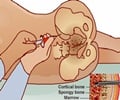Hip fractures in grandfathers are linked to low bone density and reduced bone size in their grandsons, a study, published in the Journal of Clinical Endocrinology & Metabolism, has shown.
Hip fractures in grandfathers are linked to low bone density and reduced bone size in their grandsons, a study, published in the Journal of Clinical Endocrinology & Metabolism, has shown.
"This is the first time this risk factor for low bone mass has been demonstrated across two generations," says associate professor Mattias Lorentzon, who led the research team at the Sahlgrenska Academy. "This new risk factor may be significant for the diagnosis of low bone mass and suggests possible mechanisms for the inheritance of low bone mass and fracture risk."The study looked at around 3,700 grandparents and their grandsons from a national register. 270 of these grandsons had reduced bone density, in other words less bone mineral in their skeleton. All of these also had a grandparent who had broken their hip, as opposed to those who did not have any relatives who had broken a hip and had normal bone health.
"We then divided these men with reduced bone density into two groups," says Lorentzon. "In the first, we looked at those who had a grandmother who had broken a hip. In the second, we looked at whether a grandfather had suffered a hip fracture."
It emerged that the men who had a male relative who had suffered a fracture had up to 5% less bone density and 4% smaller bones than those who did not. By way of comparison, 10% less bone density can increase the risk of fractures as much as threefold.
In its study, the research team also took account of other risk factors for osteoporosis, such as smoking, physical activity, calcium intake, age, weight and gender.
"Despite these other risk factors, we could see that bone size is reduced and that this leads to lower bone density, which together means low bone mass – a risk factor for osteoporosis. In other words, they run a greater risk of fractures in the future than their peers."
Advertisement
"It's important for health professionals to ask whether grandparents have had hip fractures," says Lorentzon. "This is an important piece of the puzzle when it comes to the diagnosis and treatment of osteoporosis."
Advertisement
Source-Eurekalert
RAS











